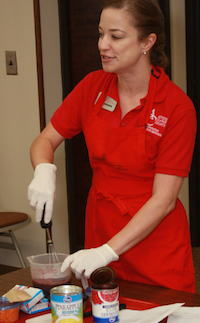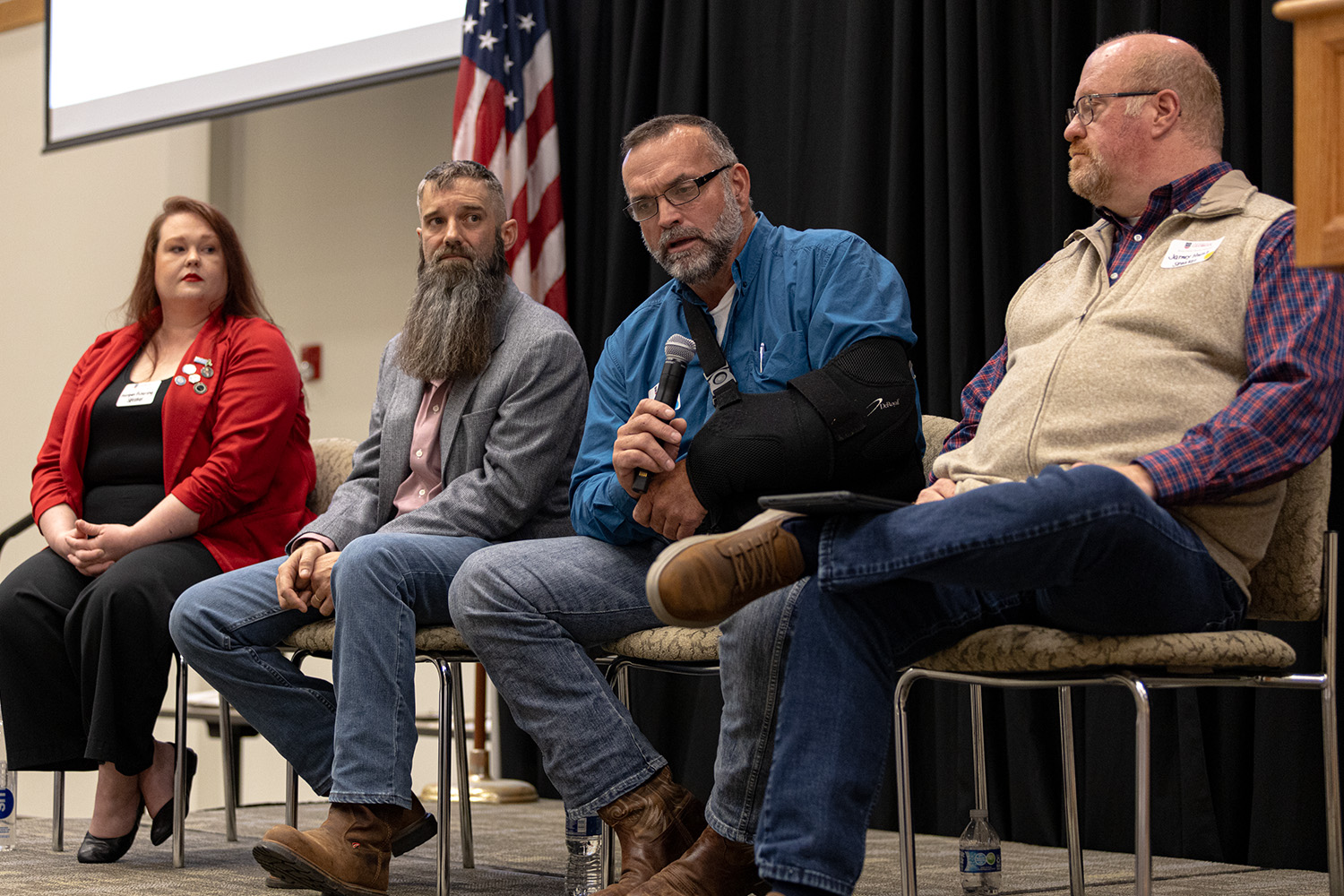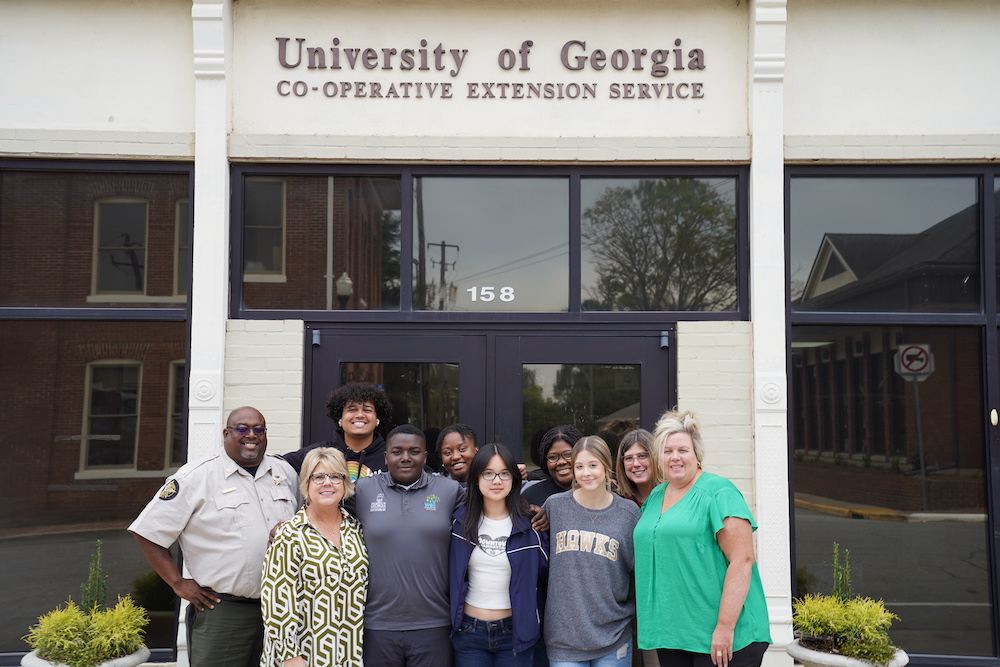University of Georgia Cooperative Extension is focused on improving the quality of life and health of Georgia residents, says Associate Dean for Extension Laura Perry Johnson.
UGA Extension agents and specialists develop programs that help families to engage in physical activity, decrease obesity, live with cancer and diabetes, prepare meals safely, and eat healthily while stretching their food dollars.
“These programs help individual Georgians live healthier, higher-quality lives, improving the overall health and well-being of our citizens. This will decrease health care costs and ultimately enhance the economy of the state in the future,” Johnson said. “We know the rural areas of our state have greater needs related to health and quality of living, and improving these statistics is a priority for UGA Extension.”
Through Supplemental Nutrition Assistance Program Education (SNAP-Ed) and the Expanded Food and Nutrition Education Program (EFNEP), more than 8,600 Georgians enrolled in UGA Extension-taught nutrition education classes in 2017.
UGA Extension nutrition educators reached another 50,000 people directly, according to Deborah Murray, UGA College of Family and Consumer Sciences (FACS) associate dean for extension and outreach. More than 1.3 million Georgians learned about the nutrition and healthy behaviors required to prevent obesity through online education programs.
Obesity rates in Georgia are among the highest in the country. Two of Georgia’s counties — Calhoun and Taliaferro — have obesity rates higher than 40 percent. This is attributed in part to limited access to healthy foods. Taliaferro County’s 1,600 residents don’t have access to a grocery store in their county.
“When you don’t have access to fresh produce, it’s really hard to eat healthy, especially when everything you buy comes out of a box or a can,” said Denise Everson, FACS program development coordinator for UGA Extension’s Northeast District.
The Centers for Disease Control and Prevention (CDC) provided federal assistance to alleviate Calhoun and Taliaferro counties’ high obesity rates. Two years ago, the CDC issued a grant to UGA Extension and the UGA College of Public Health (CPH) to provide health and wellness education, promote physical activity, and increase access to healthier foods in both counties.
Marsha Davis, associate dean for outreach in the CPH’s Office of Outreach and Engagement, Health Promotion and Behavior, served as the principal investigator and team leader for this collaboration.
UGA Extension in Calhoun County helped to develop six community gardens that include 30 raised beds planted with fall and spring crops every year. Area 4-H staff started a fitness and nutrition club for children after school. Extension also offered a Cancer Prevention Cooking School for adults, which attracted more than 20 county residents. In addition, four municipalities in Calhoun County are installing walking trails.
Through a collaboration with Touching Taliaferro with Love Inc., a group that sponsors summer programs for students, UGA Extension in Taliaferro County provides nutrition and healthy living classes at local school buildings. Extension also promotes exercise sessions for seniors at the county senior center.
Andrea Scarrow, FACS program development coordinator for UGA Extension’s Southwest District, said the CDC is in the process of issuing a second phase of funding and has identified three more Georgia counties that qualify for assistance: Clay, Dooly and Stewart counties.
“Programs like these are beneficial because, in rural areas, you have less access to health care, you have fewer resources economically and you also have higher poverty levels that affect health and well-being. Where you have generational poverty, you have greater health needs,” Scarrow said.
According to the U.S. Census Bureau, 25 percent of Georgia’s population lives in rural areas. A significant portion of rural Georgians have limited access to healthcare facilities.
Georgia has fewer primary care physicians per person than most of the nation. In 2012, Georgia was ranked No. 49 in the country for the state’s ratio of primary care physicians: 31 primary care physicians per 100,000 people. The national average was 46.1 primary care physicians per 100,000 people.
This problem hits very close to home for Everson. “My family lives in Grady County and my in-laws live in Miller County, both rural counties in southwest Georgia. I am concerned because my dad is 80 years old, and what if my mom couldn’t drive him to Tallahassee, Florida, for medical attention? They have limited resources in their community for specialty care,” she said.
Nationally, there are more physicians in urban areas than in rural areas. In other parts of the nation, physician assistants and nurses working in rural areas helped alleviate some of the issues related to access to care, said Ali Berg, UGA Extension specialist for nutrition and health.
“However, in a study of 2012 data, Georgia was the only state that was significantly lower than the national average for the number of physicians who had physician assistants working in their offices,” Berg said.
Rural Georgians without health insurance, or those who have limited access to health care, typically aren’t screened for high blood pressure, diabetes or cancer. Extension-led health fairs provide these services across Georgia at little to no cost.
“Research shows that earlier diagnoses through screening reduce the risk of dying from cancer,” Berg said. “That’s why we’re doing this. We want people to get this information so that they can prevent cancer. If, unfortunately, they do get cancer, we hope that encouraging them to get screened sooner or at all will help detect cancer when it is still treatable and, likely, less costly to treat.”
FACS Extension agents offer classes called “Cooking for a Lifetime: Cancer Prevention Cooking Schools,” available across rural areas of Georgia. These classes educate participants about their risks for breast, cervical and colorectal cancer; encourage them to schedule cancer screenings; and provide nutritional guidelines and physical activity recommendations, all with the goal of preventing cancer. Since 2017, this program has reached more than 1,000 Georgians in 31 counties.
The impact of these programs is often immeasurable, but the education residents receive should lead to life changes that reduce the cases of cancer, deaths from cancer, and the financial impact of cancer on Georgia’s families and economy.
More than 860,000 Georgians have been diagnosed with diabetes, and estimates say that over 460,000 remain undiagnosed. In Washington County, Georgia, physicians refer newly diagnosed patients to the local UGA Extension office for “The Ins and Outs of Diabetes” class.
The class covers various aspects of diabetes: understanding the basics of the disease, counting carbohydrates, making better food choices, exercising, monitoring blood-glucose levels and preventing complications. More than 100 patients have attended the class, and the county Extension agent provides one-on-one counseling to patients between classes.
FACS, Agriculture and Natural Resources, and 4-H agents all play a role in enhancing community health and wellness. UGA Extension agents educate Georgia’s youth about healthy living through the Georgia 4-H program.
In Cook County, Georgia, health outcomes like length and quality of life and health factors like tobacco use, diet, exercise, and alcohol and drug use are rated very low.
The county Extension agent reaches schoolchildren through 4-H yoga lessons, a running club and nutrition classes. The agent also provides mental health lessons about coping with stress and anxiety, including programs describing the dangers of drugs, alcohol and tobacco. To date, close to 3,000 Cook County students have learned how to improve their physical and mental health through Extension classes.
In another project, UGA Extension agents in Georgia’s Calhoun, Colquitt and Washington counties are piloting a nationwide training through the 15-state Robert Wood Johnson Foundation Building Culture of Health partnership with Extension. Led by UGA Extension 4-H Specialist Jenna Daniel and FACS Program Development coordinators Scarrow and Lisa Jordan, the project involves all of Extension’s program areas: FACS, ANR and 4-H. The team also includes UGA Extension agents Georgeanne Cook, Shanda Ashley and Kathryn Holland.
“The Robert Wood Johnson Foundation, as well as other organizations, sees Extension doing for rural health what it did for agriculture,” Murray said. “In Extension, we have always dealt with health: well-water safety, food safety, nutrition, youth development. Today, the view on medicine and public health is much more integrated and holistic than in the past. People now want to grow the food, keep it safe and use it as an important part of preventative medicine.”
For more information from UGA Extension on how to eat healthier, plan diabetic-friendly meals, fight obesity and other health-related topics, go to extension.uga.edu/publications. For more about the national impact of UGA Extension’s partnership with SNAP-Ed, visit fcs.uga.edu/extension/uga-snap-ed.






.png)
